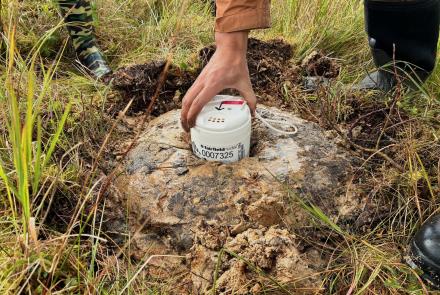Little Things Mean A Lot
There's a famous old poem that blames the downfall of a kingdom on a missing horseshoe nail: "...for want of the nail the shoe was lost, for want of the shoe the horse was lost..." and so on through lost soldiers, battles, wars, and crowns. The poet's point was that little things indeed can mean a lot, and overlooking them can lead to big difficulties.
We also tend to shrug off quantities at the other end of the scale. The size of the United States' national debt, for example, is a true mind-boggler; we just can't comprehend what that enormous number means. Yet, as the newspapers and economic commentators tell us every day, we avoid confronting that number only at our peril.
It seems we catch it either way. We tend to relate to things on a scale that is commensurate with our perspective whether we happen to be an amoeba or an intergalactic monster. We are largely incapable of comprehending the big things, and we simply don't appreciate the importance of little things. Nature keeps setting examples for us, but it appears that they are lessons we have yet to learn.
K.C. Cole makes an interesting case for the little things in a recent article appearing in Science Digest. Among the examples he cites is that the difference between the lifeblood of plants and that of people is only one atom: chlorophyll is made up of 136 atoms of hydrogen, carbon, oxygen and nitrogen arranged in a ring around a single atom of magnesium; hemoglobin is made up of 136 atoms of hydrogen, carbon, oxygen and nitrogen arranged in a ring around a single atom of iron.
On the level of human affairs, a single vote could conceivably decide a presidential election. A single shot fired at Sarajevo in 1914 killed Archduke Ferdinand, heir to the throne of Austria-Hungary, and started World War I, which changed the history of the world.
But the example that I like best of how little things can compound into major things was first described several years ago by Dr. Albert Bartlett in the American Journal of Physics.
Bartlett proposed that a colony of bacteria living inside a Coke bottle is doubling its numbers once per minute. Then he asked his readers to join him in also assuming that these bacteria were as thoughtful as people, neither more nor less. The scenario begins at 11:00 A.M. when there are so few bacteria as to be invisible. Although they are unaware of it at the time, the rate at which they are multiplying is such that the bottle will be full by noon. Bartlett's question was: When would even the most far-sighted of the bacteria realize that they were running out of room?
At 11:58 A.M., the bottle would still be only one-quarter full! Obviously, few would see the need to panic yet. Only one minute later, at 11:59, the bottle would be half full, but why worry? There is still as much room left as had ever been used by the colony's entire population. By now, a few of the more astute bacteria have begun to understand the nature of the problem. Realizing that they only have one minute left until overpopulation kills them all, they send an expedition into "outer space" and, lo and behold, three new Coke bottles are found. Now the suddenly crowded population can breathe a sigh of relief and send the overflow into spacious new quarters. But how much time will they have left before they are again out of living room? Answer: Two more minutes.
It's a sobering example and, humorous or not, deserves to be taken seriously in view of the crowded conditions already existing in many parts of the world.




